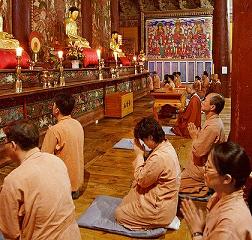
|
|
|
Home Asia Pacific North Asia S/N Korea Temple Stay Voyage hallyu: K-Pop meets Temple Stayby Emi Hailey Hayakawa, BTN, Aug 30, 2012Seoul, South Korea -- Korean Pop music, otherwise known as K-POP, has allured many French people into Korean pop culture, and now these people have become enchanted by the Korean Temple Stay program.
VOYAGE HALLYU was a special package created by the Korean Ministry of Tourism and with various travel agencies for foreigners in response to the popularity of K-POP and Korean culture. During their stay in Jeondungsa Temple, the 40 participants were taught the basic customs of the Korean traditional monastic life by Ven. Haein, and experienced the monastic way of eating through balwoo gongyang (bowl offerings). On the second day, their schedule included early morning Buddhist chantings, meditation, 108 prostrations, Morning bowl offerings, and walking meditation at the mountain adjacent to the temple. The participants was delighted to be immersed in nature, and away from the everyday bustle and hustle of modern life.
The creator of VOYAGE HALLYU, CEO of CapCoree, Fredrick states that “In France K-POP is quite popular and represents the modern Korean Culture. The Temple stay program represents the traditional Korean Culture and VOYAGE HALLYU lets participants experience both the modern and traditional Korean Culture.” He carries on to say that “..the Temple stay program is a completely new experience for French people as most of them are Catholic. Thus, I am happy that we are able to offer an opportunity for many people to experience the traditional culture and to promote a better understanding of Asia.” |
 |
|
| Korean Buddhist News from BTN (Korean Language) |
|
 |
|
|
Please help keep the Buddhist Channel going |
|
| Point
your feed reader to this location |
|

 The Cultural Corps of Korean Buddhism headed by Ven. Beop Jin, opened a 2 day Temple Stay program from August 16th to August 18th for the 40 French Tourists of the VOYAGE HALLYU group at Jeondungsa Temple in Incheon, Korea.
The Cultural Corps of Korean Buddhism headed by Ven. Beop Jin, opened a 2 day Temple Stay program from August 16th to August 18th for the 40 French Tourists of the VOYAGE HALLYU group at Jeondungsa Temple in Incheon, Korea. 

